View Larger Image

College of Pharmacy students visiting Rome in 2023. The once-in-a-lifetime experiences bring pharmacy students thousands of miles away to improve their knowledge.
Image by Joseph Brill
Pharmacy Students Learn, Make Lasting Memories on International Rotations
| A hallmark of the fourth and final year of school for UAMS College of Pharmacy students is experiences, where they work alongside pharmacists providing care for real patients. These are primers for the pharmacy world once their education is complete. Some pharmacy students take that a step further, doing elective experiences thousands of miles away in Taiwan, Thailand and Italy.
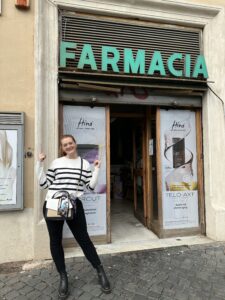
Pharmacy student Amanda Russell visited a pharmacy in Rome to interview a community pharmacist.Amanda Russell
It’s a once-in-a-lifetime opportunity that enables College of Pharmacy students to gain worldly knowledge and experience that they can take back to better serve patients at home.
“Students learn about different facets of international pharmacy practice while being immersed in the culture of their host country,” said Seth Heldenbrand, Pharm.D., the College of Pharmacy’s associate dean of experiential education. “These are extremely valuable experiences for our students, and they put in a similar amount of work as they would for any other student experience.”
Pharmacy students can choose from one of three options for international rotations: Kaohsiung Medical University in Taiwan, Silpakorn University in Thailand, and the University of Arkansas Rome Center in Rome, with each rotation lasting four weeks.
In 1980, then-UAMS Chancellor Harry Ward, M.D., signed an exchange agreement between UAMS and Kaohsiung Medical University. After a period of inactivity, Kaohsiung College of Pharmacy officials reached out to reactivate the program, with the first UAMS students journeying to Taiwan in 2012. The regular exchange now involves six students from Kaohsiung coming here each August and six students from UAMS going there each fall. The exchange became interprofessional in nature with the inclusion of nursing students in 2018. Following an interruption due to the COVID-19 pandemic, the exchange program resumed in 2023.
Fourth-year pharmacy student Victoria Tang spent her rotation at Kaohsiung affiliate hospitals. While there, she saw how Western medicine and traditional Chinese medicine are given equal importance in patient care.
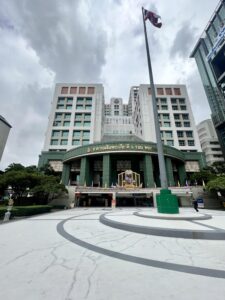
Pharmacy students visiting Thailand did their rotations at Phramongkutklao Hospital in Bangkok.Alan Herrera-Rueda
“What I noticed is that traditional Chinese medicine has a more holistic approach, taking concern of the balance of a person’s health as a whole, not just the disease or ailment that was troubling them at the moment,” Tang said.
Tang also said that Taiwanese pharmacists are not able to do the same things American pharmacists do, such as prescribing medications within their scope of practice, giving vaccinations or testing for flu or COVID-19. However, they do have similar training, in addition to their knowledge of traditional Chinese medicine.
“It was really insightful to experience and learn about health care in Taiwan,” she said.
“In Taiwan, there’s so much to learn about the different areas of Eastern practice, and things we don’t have access to here,” Heldenbrand said. “It’s much more general exposure, whereas the Thailand rotation is more focused in clinical pharmacy practice.”
Last year, the College of Pharmacy hosted two Silpakorn students for six weeks of rotations. Students in Thailand begin pharmacy school following high school graduation and attend for six years instead of four, with their final year reserved for rotations.
At UAMS, the students shadowed in various practice settings, including solid organ transplant, intensive care, oncology, ambulatory care and community pharmacy. Sixth-year pharmacy students Phatsaraphon Chudongkaew and Kanyanat Suwannapoome gained a lot from the experience, saying they were eager to take what they had learned back home to benefit patients.
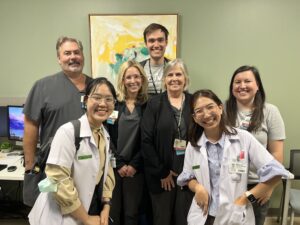
Last year, Phatsaraphon Chudongkaew and Kanyanat Suwannapoome visited the UAMS College of Pharmacy.Kanyanat Suwannapoome
“What stood out the most was the warmth from both students and the professors,” Chudongkaew said. “Their welcoming nature and valuable insights made it the best time of my pharmacy student life. I’m grateful for these memories and lessons that will undoubtedly shape my career.”
Suwannapoome said pharmacy technology in the U.S. is more advanced than in Thailand, noting the use of paperless systems and more efficient dispensing machines, along with conveniences like drive-thru pickup at local pharmacies.
“My time at the UAMS College of Pharmacy was the most memorable experience of my life,” Suwannapoome said. “These rotations provided invaluable insights into patient treatment. I can see how advanced technologies and a clinical approach significantly enhance the accuracy and quality of life for patients at UAMS.”
Fourth-year pharmacy student Alan Herrera-Rueda was one of three College of Pharmacy students to do a four-week rotation at Phramongkutklao (PMK) Hospital in Bangkok. PMK is the official hospital of the Royal Thai Army and trains doctors to treat service members.
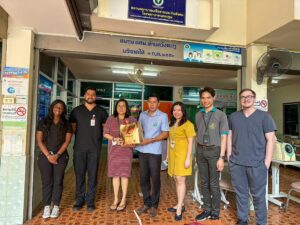
College of Pharmacy students Tiara Mickens, Alan Herrera-Rueda and Austin Richards visited a rural clinic in Thailand during their rotations.Alan Herrera-Rueda
Herrera-Rueda said he noticed differences and similarities in Thailand’s health care system. For instance, the country has universal health care, with some plans costing as low as $1. Military members and government employees receive additional benefits. It also shares similar guiding principles to Western medicine but lacks a nuclear pharmacy program.
“One of the biggest takeaways I learned from the experience is to not be afraid to travel,” Herrera-Rueda said. “It was a wonderful experience, and I am grateful I had a chance to go.”
Rome rotations, sponsored by the University of Arkansas Rome Center, focus on cultural immersion, interprofessional experiences, and on-site learning about pharmacy and the Italian health care system. The rotations first came about when Heldenbrand was on his honeymoon in Rome in 2019, and he and his wife dined near the center without realizing it.
“We’re finishing up lunch, and in walks an Italian gentleman with an Arkansas Razorbacks T-shirt,” Heldenbrand said. “We got to talking, toured the center and started emailing, and one year later, we had 10 student pharmacists headed to Rome.”
Fourth-year pharmacy student Amanda Russell spent her rotation in Rome with 15 other College of Pharmacy students and came away impressed.
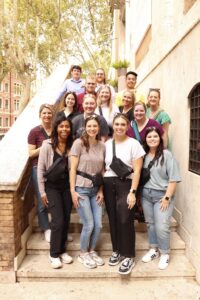
Cultural immersion was one aspect of the Rome rotation. Here College of Pharmacy students visit the Museum and Crypt of the Capuchin Friars in Rome.Amanda Russell
“We were able to meet with pharmacists around the city and discover the similarities and differences in care there versus at home,” Russell said. “One of my favorite activities was visiting Gemelli Hospital, where the pope receives care and treatment.”
Students visited many well-known historic sites in Rome, including the Colosseum and the Roman Forum. There was also a weekend trip to Florence and the Officina Profumo-Farmaceutica di Santa Maria Novella, which is the oldest pharmacy in the world, dating back to 1221.
“As someone who had previously visited Rome more than a decade ago, I loved getting to spend more quality time in this amazing, ancient city,” Russell said. “The month went by so quickly, and I wished it would never end. I am so thankful to the College of Pharmacy for giving me the opportunity to have this once-in-a-lifetime experience.”
“We try to match students to the experience that they’re most interested in,” Heldenbrand said. “Each rotation is an amazing learning opportunity, and we’re proud to be able to offer these experiences to our student pharmacists.”